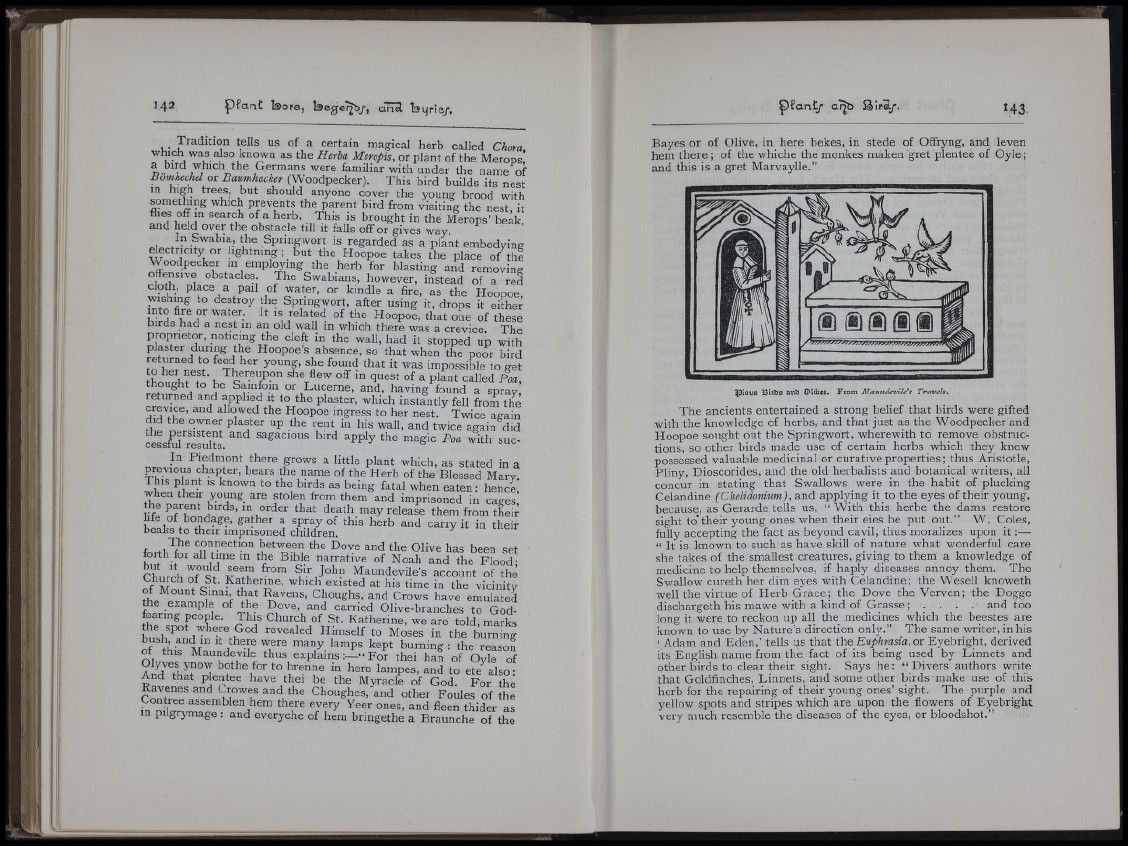
m m w
i 1
Tradition tells us of a certain magical herb called Chora,
which was also known as the Herba Meropis, or plant of the Merons
a bi J which the Germans w j e familiar with under the name of
Bondiechel ox Baumhacker (Woodpecker). This bird builds its nest
high trees, but should anyone cover the young brood with
jm e thm g which prov j t s the parent bird from visiting the nest, it
search of a herb. This is brought in the Merops’ beak,
and held over the obstacle till it falls off or gives way.
Swabia, the Springwort is regarded as a plant embodying
el j t j i t y or lightning ; but the Hoopoe takes the place of the
WoodpeckJ m em p ljin g the herb for blasting and removing
offensive obstacles. The Swabians, however, instead of a red
cloth, place a pail of water, or kindle a fire, as the Hoopoe
wishing to destroy the Springwort, after using it, drops it either
into fire or water. It is related of the Hoopoe, that one of these
birds had a nest m an old wall in which there was a crevice The
proprietor, poticmg the cleft in the wall, had it stopped up with
plaster during the Hoopoe’s absence, so that when the poor bird
to h.r n . ? mu impossible to get
tL n th ? to 1 she flew off in quest of a plant called Poa,
thought to J Samfoin or Lucerne, and, having found a sprav
returned and applied it to the plaster, which instantly fell from the
J j i c e , and allowed the Hoopoe ingress to her nest. Twice again
did the owner plaster up the rent in his wall, and twice again did
ceLfu7 refults. bird apply the magic Poa with suc-
In Piedmont there grows a little plant which, as stated in a
previous chapter, bears J e name of the Herb of the Blessed Mary
T J s plant is known to the birds as being fatal when eaten : hence
too oil T J R imprisoned in cages]
Hfo in order that death may release them from their
L w ^ ^ spray of this herb and carry it in their
beaks to their imprisoned children.
fo rto ^W J e t A j j the Dove and the Olive has been set
forth for all time in the Bible narrative of Noah and the Flood;
but It would seem from Sir John Maundevile’s account of the
of M K Jh e rm e , which existed at his time in the vicinity
Mount S in a ijh a t Ravens, Choughs, and Crows have emulated
J e example of t J Dove, and carried Olive-branches to God
f j r in g people. This Church of St. Katherine, we are told, marks
bush ^a°ndTn revealed Himself to Moses in the burning
of J tthhfios MMpaiiunjrei v i-lie® Ttuh us explains For thei han of Oryelea soonf
And that p le je e have thei be the Myracle of God. For the
ContoPP^ 1 Choiighes, and other Foules of the
Contree assemblen hem there every Yeer ones, and fleen thider as
m pilgrymage : and everyche of hem bringethe a Braunche of the
Bayes or of Olive, in here bekes, in stede of Offryng, and leven
hem there ; of the whiche the monkes maken gret plentee of Oyle ;
and this is a gret Marvaylle.”
5PioU0 3SlXti9 anti From Mawidevile*s Travels.
The ancients entertained a strong belief that birds were gifted
with the knowledge of herbs, and that just as the Woodpecker and
Hoopoe sought out the Springwort, wherewith to remove obstructions,
so other birds made use of certain herbs which they knew
possessed valuable medicinal or curative properties; thus Aristotle,
Pliny, Dioscorides, and the old herbalists and botanical writers, all
concur in stating that Swallows were in the habit of plucking
Celandine (Chelidonium), and applying it to the eyes of their young,
because, as Gerarde tells us, “ With this herbe the dams restore
sight to’ their young ones when their eies be put out.” W. Coles,
fully accepting the fact as beyond cavil, thus moralizes upon it :—
“ It is known to such as have skill of nature what wonderful care
she takes of the smallest creatures, giving to them a knowledge of
medicine to help themselves, if haply diseases annoy them. The
Swallow cureth her dim eyes with Celandine; the Wesell knoweth
well the virtue of Herb Grace; the Dove the Verven; the Dogge
dischargeth his mawe with a kind of Grasse; . . . . and too
long it were to reckon up all the medicines which the beestes are
known to use by Nature’s direction only.” The same writer, in his
‘ Adam and Eden,’ tells us that the Euphrasia, ox E5'ebright, derived
its English name from the fact of its being used by Linnets and
other birds to clear their sight. Says he : “ Divers authors write
that Goldfinches, Linnets, and some other birds'make use of this
herb for the repairing of their young ones’ sight. The purple and
yellow spots and stripes which are upon the flowers of Eyebright
very much resemble the diseases of the eyes, or bloodshot.”